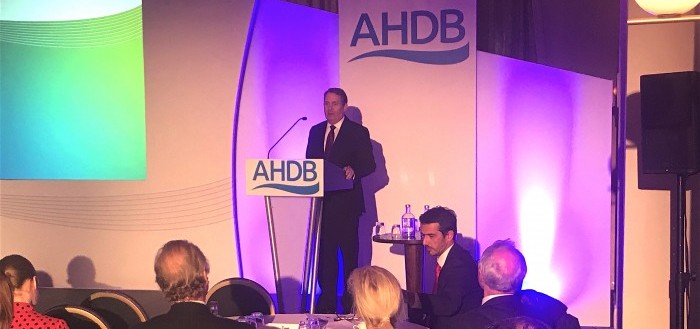Trade Secretary Liam Fox attempted to reassure an AHDB export conference that the UK had no intention to allow lower standard imports into the country after we leave the EU.
But he fell short of delivering the firm assurances many people in the room were hoping for.
Delivering an eagerly-awaited speech at the event in London on Wednesday, Dr Fox spelled out his desire to see a prosperous UK food and farming sector after we leave the EU. “The DTI regards agriculture as an industry. I want to see a vibrant industry. I want to see an agriculture sector that breeds things, grows things and sells things. That should be our primary concern,” he said
He highlighted the recent impressive growth in overall UK exports, and in food and farming in particular and explained why he was ‘optimistic’ that this trade would continue to grow after we leave the EU. He cited recent developments, including the lifting of the UK BSE ban by China and the deal to export pork products to Taiwan, alongside the longer-term backdrop of a growing world population and rising demand for meat.
Dr Fox set out the steps the Government was taking to help the sector boost exports, including representation at trade events and supporting the Agritech strategy.
‘Dishonest debate’
He also addressed the issue of post-Brexit food standards, which he described as ‘one of the most dishonest debates I have seen for a very long time’.
On Tuesday, the US trade representative formally notified Congress that they have ‘completed the preliminary work and are now ready to begin work on a free trade agreement with the UK, the first real step towards an independent trade policy’, he said. The letter states that any UK-EU trade deal must respect the US’ Trade Priorities and Accountability Act, which requires the ‘reducing or eliminating [of] unjustified sanitary or phytosanitary restrictions’ and ‘other unjustified technical barriers to trade’.
But Dr Fox insisted the UK would not lower its standards. “One of the key unique selling points for the UK is the high standards we have,” he said, citing a Barclays survey showing 57% of Chinese consumers would pay more for British products because of their reputation for high quality.
“We are never going to be able to compete at the low cost, low quality end of the market. Where we need to be is that high quality end,” he said.
But when it to questions, AHDB chairman Sir Peter Kendall challenged Dr Fox on whether his comments about standards applied to imported products as well.
The Trade Secretary said the SPS (sanitary and phytosanitary) element of the Chequers agreement would ‘maintain regulatory alignment on that’. He added: “There are some who say that will limit your freedom to do a trade agreement and, to some extent, that is right.
“But I think you are limited by UK consumer pressure in any case because I think there is a strong move from consumers not to compromise standards. Inside, the EU market ,we have our food policy legislation which we have no plans to alter.”
“I can say this until I am blue in the face. Whenever I say it, there is the same anti-trade lobby who are, in fact an anti-capitalist lobby, who will still say this isn’t true.”
He urged the audience, somewhat cryptically, not to ‘judge the Government by what it says, but by what it does’.
He insisted it was an ‘utterly bogus question’ and that the answers lay in recently-published Government documents.
Sir Peter was not entirely convinced by Dr Fox’s comments. “It was great to hear Liam Fox say ‘grow more, breed more, sell more product,” he said.
“I did ask the question about standards, but you do listen so many carefully crafted phrases. I was looking for the Secretary of State to say we will not import products in to different standards. I think he nearly got there, but it wasn’t as nailed down as I would like to see.”




